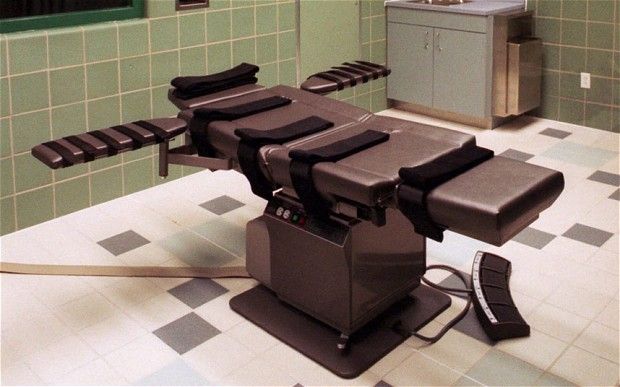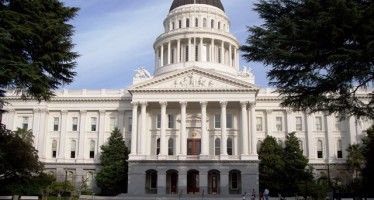CA faces dueling death penalty initiatives
 Activists on both sides of the death penalty debate were poised for an election day clash, with one group pushing a ban on the practice while the other hoped to speed it up.
Activists on both sides of the death penalty debate were poised for an election day clash, with one group pushing a ban on the practice while the other hoped to speed it up.
A new coalition
The first group, Taxpayers for Sentencing Reform, has teed up the Justice That Works Act of 2016, an initiative that would fully repeal the Golden State’s use of capital punishment. Criminal sentencing would max out at life in prison without the possibility of parole, plus “a provision that requires them to work in prison and forward most of the wages to the families of victims,” as the group noted in a press release.
Taxpayers for Sentencing Reform has assembled a broader-than-expected coalition of interests, including some conservatives who see the current system as too dysfunctional to continue. “One supporter of the initiative to repeal capital punishment in California is Ron Briggs, who was a manager of the successful 1978 initiative campaign to expand the state’s death penalty law. That measure was sponsored by Briggs’ father, state Sen. John Briggs, R-Fullerton,” the San Francisco Chronicle reported. The younger Briggs described California’s capital punishment regime as “just another dysfunctional big-government program that wastes billions of dollars without achieving its goals,” according to the Chronicle.
Although officials in Sacramento have claimed a full repeal would save not more than $150 million yearly, Taxpayers for Sentencing Reform asserted in its release that the state of California spent “at least $5 billion in sentencing more than 900 people to death” since 1978, while actually executing “13 of those 900.”
The workings of the capital punishment have taken on a particular sense of statewide urgency as death sentences have risen in California while falling nationwide. Southern California alone has taken a national lead in sentencing the convicted to death. “All told, courts have sentenced eight people to death in Riverside County this year, more than any other county in the United States,” the Los Angeles Times reported, citing a report issued by the nonprofit Death Penalty Information Center. “The county accounts for 16 percent of all death sentences imposed in the United States this year, the report said.”
Injection trouble
The dip in U.S. executions has been driven in part by a series of lawsuits over botched and painful administrations of lethal injection drugs. “In the last few years, states around the U.S. have struggled to administer lethal injections to death row inmates after pharmaceutical companies stopped selling drugs to departments of corrections that were formerly in wide use,” as Time noted. “In response, states have turned to previously untried drugs like midazolam, which was used in several prolonged lethal injections in Oklahoma, Arizona and Ohio. The drug was at the heart of a Supreme Court case earlier this summer that ultimately found Oklahoma’s lethal injection protocol did not violate the Eighth Amendment’s ban on cruel and unusual punishment.”
California stopped executing Death Row inmates in 2006, when a federal judge determined “that flaws in lethal injections and staff training created an undue risk of a botched and agonizing execution,” the Chronicle recalled.
Mend it, don’t end it?
With an eye toward reforming California’s system without scrapping the death penalty completely, state district attorneys have created an initiative that would save money and reduce the agony of languishing on Death Row by accelerating inmates’ appeals. “It would also change the way they’re housed to save money,” as KPPC reported. Their Death Penalty Reform and Savings Act of 2016 “would limit inmate appeals, which can drag on for decades, and expedite executions,” according to KQED. Like the Justice That Works Act, the DA’s initiative “would also give the California Department of Corrections and Rehabilitation more latitude in housing condemned inmates and require them to work, with 70 percent of their wages going to crime victims,” the station added.
Related Articles
Assemblyman denounces ‘bullying’ by committee chair
Assemblyman Matthew Harper, R-Huntington Beach, has accused Assemblyman Roger Hernández, D-West Covina, the chairman of the Assembly Labor and Employment
Dubious suit for more ed cash
JULY 19, 2010 By JOHN SEILER On July 12, a coalition of school activist groups sued the state of California,
Gov. Brown pardons 105 ex-cons, rescinds one
Gov. Jerry Brown offered Christmas Eve pardons to 105 Californians. But before the paperwork reached the Secretary of State’s office,




